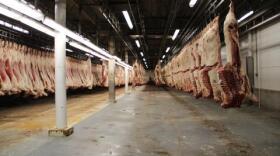Dozens of congressional Democrats are opposing a recently proposed federal rule that would change hog-slaughterhouse inspections and the number of hogs that can be processed daily.
The Modernization of Swine Slaughter Inspection rule, which falls under the U.S. Department of Agriculture’s purview, was announced in January. The politicians believe any such changes will will endanger workers at hog slaughterhouses and increase the risk for foodborne illness. But pork industry leaders argue the rule would provide a much needed update to a system that’s become obsolete.
The proposed rule would lift the cap on how quickly pigs can be slaughtered. According the federal Bureau of Labor Statistics, the injury rate for employees in meatpacking plants is 2.4 times higher compared to other industries.
The proposal also would allow plant employees to carry out the initial visual inspection of incoming animals, which is currently the responsibility of federal inspectors. In turn, the agents would focus on other parts of the plant, like testing for harmful bacteria and ensuring the humane handling of animals.
The Food and Safety Inspection Service (or FSIS) has said the new regulations will place more emphasis on testing to prevent the spread of bacteria that can cause foodborne illnesses.
A push to increase slaughter speeds isn’t isolated to the hog industry. Recently the FSIS introduced a waiver program for poultry slaughterhouses to process 175 birds a minute versus the former requirement, which was 140 birds per minute.
The letter sent to the USDA on Monday by 63 representatives (including Mike Quigley of Illinois, Emanuel Cleaver of Missouri and Dave Loebsack of Iowa) urged the USDA to “withdraw the rule immediately.” In it, they also pointed to a 2018 report from Water and Food Watch alleging that similar programs had been unsuccessful. The report reviewed records from the USDA and found that 30 percent of plants operating under a similar pilot program, known as the New Poultry Inspection System, failed to comply with salmonella performance standards.
The National Pork Producers Council said the new swine inspection rule will modernize a system that has existed for 100 years. Dan Kovich, the council’s director for of science and technology, said the old rules were designed during a time when visible health risks, like blemishes or cancers, were more common but slaughterhouses now need to focus more on microbiological issues.
“[The new system] allows both industry and FSIS to focus on things that are offline that can really make an impact on food safety,” Kovich said.
Kovich also said that, regardless of speed or where federal inspectors are stationed, every slaughterhouse must still comply with federal laws and regulations to ensure safety and the humane treatment of animals. “Not everyone is just going to turn up a knob somewhere and just move faster without a lot of care, thought and intention into making sure that they can do it appropriately,” he said.
The USDA is taking public comment on the proposed changes through Wednesday.
Follow Esther on Twitter: @estherhonig
Copyright 2018 Harvest Public Media










